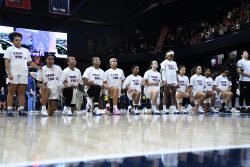You may not have heard of Mary Ellen Clark. During the 1990s, she was one of the premier Olympic divers in the United States, and I—for no apparent reason outside her ability to kick a lot of post-communist posteriors and emerge from the water looking like she’d spent the day in an Icelandic spa—idolized her. In the fashion typical of former athletes, she has disappeared from the dazzling spotlight of the international diving community and now coaches happily at Mount Holyoke College.
Whether an athlete is hero only to an eight-year-old girl or a stud idolized worldwide, their fame is—like soufflé and the effects of Botox—fleeting. What is truly telling is how former athletes choose to spend their lives post-sports. Pete Rose made a lot of Maaco commercials, Tonya Harding boxed professionally in between misdemeanors and Cal Ripken continues to coast on his good looks.
Georgetown, as a basketball powerhouse both past and present, has had a number of athletes go on to the glamour of professional sports. What these players did on the court was a testament to the skills they cultivated during their tenures wearing blue and grey. What they did off the court and away from the Hilltop is a testament to how crucial they consider their Jesuit education and the greater ideals inherent to Georgetown life.
Taking the “men for others” motto literally, several former Hoya hoops stars have demonstrated selflessness and compassion. When Patrick Ewing Sr. learned that his former Georgetown teammate Alonzo Mourning had developed a life-threatening kidney disease, he offered his own organs to his friend. Dikembe Mutombo recently opened a hospital (named for his late mother) in his native Democratic Republic of Congo and was honored for his actions in a Vanity Fair profile.
My purpose is not to add any more to the demi-god status already enjoyed by these athletes. I will be the first to say that like any one of us, sports stars are deeply flawed creatures, they just happen to have a much easier time getting dates.
Victor Page was one Georgetown star who was overwhelmed by his hubris. He played for the Hoyas from 1995-97, led the Big East in scoring and helped his team reach the Final Four. Former teammate Dennie Flowers said that Page was “one of the most physically talented players we had,” saying that in some respects, the shooting guard was even better than Allen Iverson. But Flowers, who also served as an RA to Page, was ultimately disappointed by his friend.
“He’s one of those kids who saw this as a ticket to the NBA, to being rich,” Flowers said. “He didn’t take advantage of falling back on education.”
In 1997, Page entered the NBA draft but missed pre-draft practices due to his late-night drinking. After that, Victor was drafted by the Continental Basketball League and played ball in Europe for a while. He remains a legend more for his temper than his talents; during one game he grabbed a broom from the sidelines and began jabbing an opposing player with it.
Page’s life took a tragic turn in 2003 when he was shot in his old neighborhood of southeast D.C. The bullet went through his eye. Page now wears a patch to cover up the empty space.
Jeff Green, who chose to leave Georgetown for the arena of professional sports this year, has now entered into that hallowed realm of former Hoya stars. What awaits Green in the NBA is likely fame and fortune. After three years on the Hilltop, however, I hope that Jeff will remember a little more from his college years than just the adoring chants and cheers of fans. Knees may grow stiff, muscles may tear, legs may slow down, but the flawed men and women of Georgetown must always be for others.




